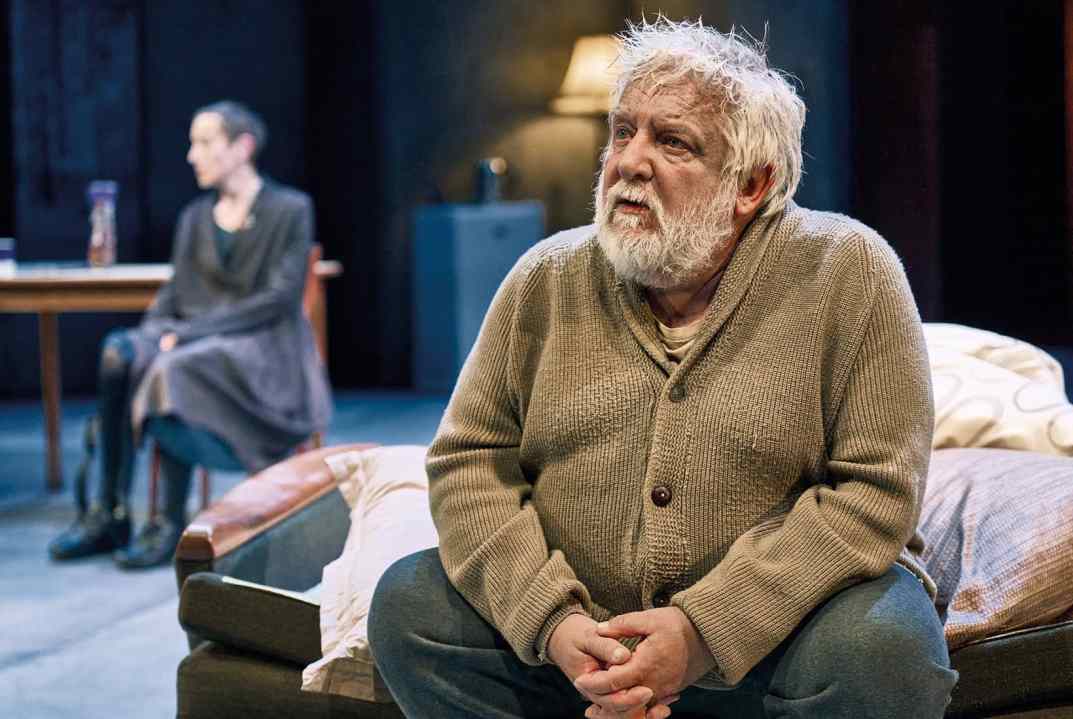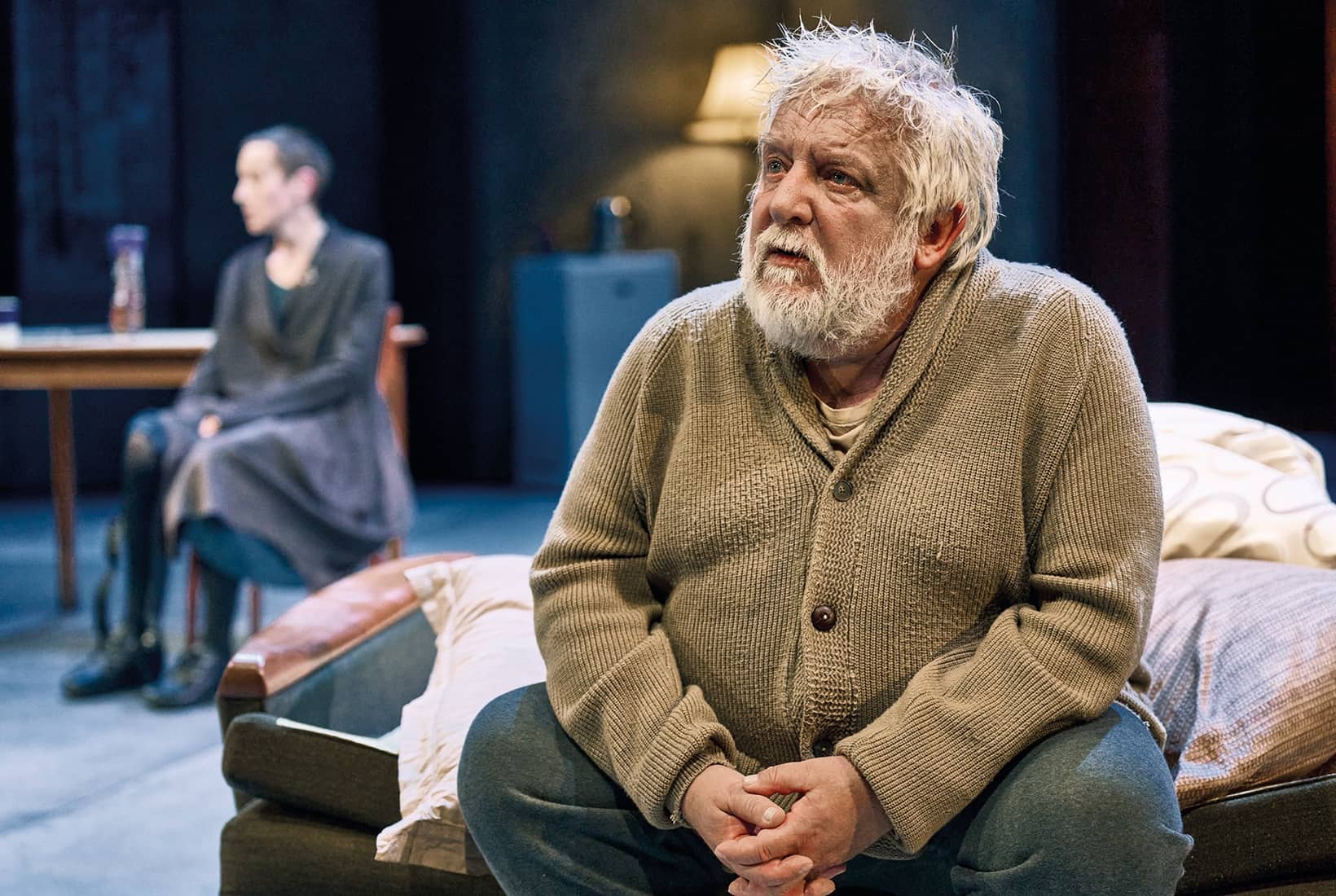Clunk, clunk, clunk. John Gabriel Borkman opens with the obsessive footfalls of a disgraced banker as he prowls the attic of a shabby townhouse. On a beaten-up sofa lies Gunhild, his estranged wife, who guzzles Coke and watches TV game shows. The whole place stinks of stagnation and failure. The reclusive Borkman was once the country’s best-known banker until envious colleagues accused him of embezzlement and got him sent to jail for five years. After his release, he began a life of self-destructive solitude. The family are more riven with feuds than the royals. Gunhild loathes her twin sister, Ella, while Borkman blames both women for his downfall. His one hope, his son Erhart, openly shuns him and prefers the company of a sexy local seductress.
The character of Borkman repels and fascinates. He could be Kevin Spacey, Robert Maxwell, Prince Andrew or Bernie Madoff. He was once a keen lover of women and he now talks like a gross misogynist. ‘Name me a single woman who is any use to anyone?’ His magnetism and intellect make him a great social animal but he destroys the affection of his only friend, Willhelm, who aspires to become a novelist. ‘You are not and never were a writer,’ says Borkman with devastating cruelty. Later Willhelm returns, having been knocked off his bike by a speeding car. ‘Everyone gets run over from the time to time,’ shrugs Borkman.
This show seems strangely topical at a time when Westminster is strewn with ousted titans
His caustic jibes often become comedic and Simon Russell Beale encompasses both extremes in a performance of enormous charm and depth. He gives the proud and haughty Borkman an approachable, witty side and at times he makes him cuddly and loveable. And the portrait straddles several decades. We can see the reality of the fallen hero – ‘a great wounded eagle’ as he calls himself – but we also detect traces of Borkman’s magnificence in his heyday. He regarded banking as a sacred art and he saw himself as a charitable sorcerer who could conjure wealth from the resources of nature and spread it across the world.
In this play, Ibsen finds bankers guilty of corruption and greed while honouring the essential benevolence of capitalism. What keeps Borkman alive is his half-mad ambition to make a comeback and to return to the realm where he was best able to express his flawed genius. This is a show for politicians and it seems strangely topical at a time when Westminster is strewn with ousted titans (Rishi, Boris, Gove), all plotting their next move.
The Crucible has a strong claim to be the best American play of the last century. Done effectively, Arthur Miller’s drama about witch trials keeps an audience riveted from the opening beat. Lindsey Turner’s production starts with a surprise. A church full of women are singing hymns while a frowning cleric paces the aisle looking for misconduct. Suddenly ‘thwack!’ – he brutally slaps a little girl who falls out of her pew. This simple gesture instantly establishes the play’s motifs: worship, superstition and violence. And there’s little to quibble about elsewhere in this sumptuous production. The sound track is too loud and the actors can’t alway be heard. And the males are dressed in the boots and donkey jackets of 1950s longshoremen. Why not costumes from the right period?
Turner handles the super-sized Olivier with intelligence and guile by creating two linked but separate playing areas. Most of the action takes place up front on the main stage. The second space, against the rear wall, is used for passages of artful mime that supplement and explain the action. This effect, using sparingly, is stunning to see. And it creates a sublime final tableau as the play’s last victim is led away, in a wash of ghostly light, towards heaven or hell. One hopes that other directors will attend this show, with notebooks at the ready, and learn from Turner’s bravura handling of colour, light and space.
Eileen Walsh (Elizabeth Proctor) and Brendan Cowell (John Proctor) are decent actors but they both seem a little mature for their roles. Cowell is ruggedly handsome, if a little puffy around the middle, and he sports a greased quiff which looks a bit too rockabilly for the early 1600s. And he lacks sex appeal. He needs to be a genuine heart-throb or Abigail’s plot to steal him from Elizabeth seems incredible. This is more than a passing crush. Abigail accuses Elizabeth of a capital offence in order to get her hands on John who must seem to be a prize worth killing for. And the NT might have cast the net a bit wider. Why not invite A-list actors from Hollywood to populate one of the greatest plays in the American dramatic canon? Hiring big names also solves problems at the box office. The NT is an international stage which has no need to behave like a provincial theatre.








Comments